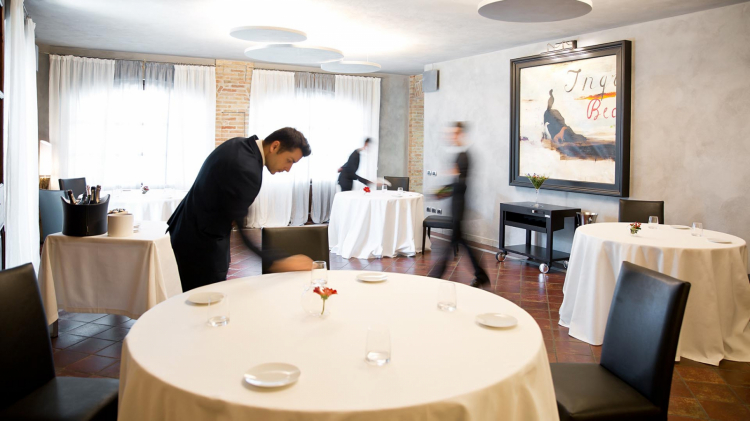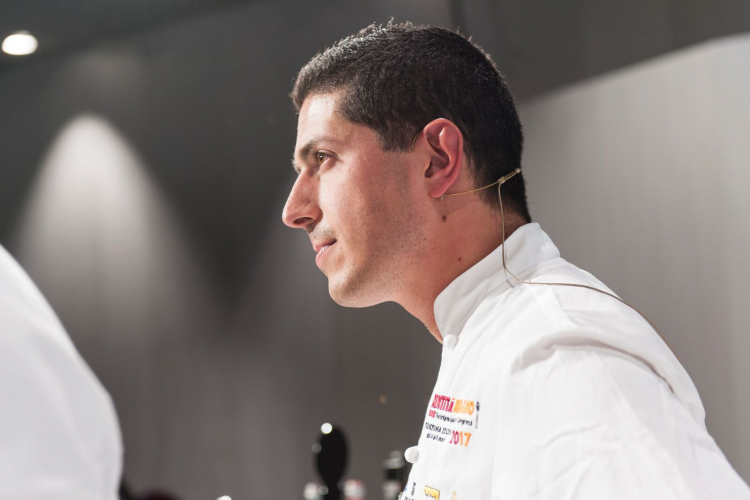«Marc Meneau told me about a guy who once knocked on his door. He was Catalan, his name was Ferran Adrià and he wanted to learn to cook. He did. This episode struck me. See, I look at what Niko Romito or Enrico Crippa have accomplished in a few years and think: if you’re fully committed, you can aim very high. And get three stars too» says Michelangelo Mammoliti. In this sentence there’s the strict perseverance, the strong ambition, and firm dedication of this young chef with a crystal clear yet still magmatic talent who serves himself and his overflowing creativity at La Madernassa.

La Madernassa with swimming pool
The fact the restaurant is in Guarene, on the border between Roero and Langhe, is in fact just a useful information to set your GPS («I use local products, but flavours and techniques are international»). Indeed
Mammoliti doesn’t compromise with the territory – which however he doesn’t snub: «I need it to find the right harmony». His attitude is cosmopolitan, he combines the world with his strong personality. He certainly thinks well of himself. His ideas are a kaleidoscope of different stimuli: Teutonic determination, French training, Piedmontese memories (he was born in Giaveno, the village where
Matteo Baronetto was also born), experience in the east, superstructures placed on sound foundations connected with his home culinary memory, that is to say to an essentially Mediterranean tradition: his grandparents on his father’s side are from Calabria and ran
Americano in Avigliana, where the chef first began.
He blends everything without reverential awe, even in a daring sequence within the same tasting menu. To those who ask him the reason behind this palate roller-coaster he shrugs and quotes Meneau, one of his masters together with Marchesi, Baiocco, Ducasse, Gagnaire and Alléno: «He always said every dish had to be different from the other, or else the experience would lose colour. I love peaks, I call them le bombe». For sure this turns the placid, always satisfying but sometimes a little monotonous gastronomy of the Langhe upside down.

Patron Fabrizio Ventura, second to the right, with the dining room staff
Patron
Fabrizio Ventura – he had the nice, in fact brave intuition of trusting the young chef – follows his evolution like someone who has an
enfant prodige at home and must dose his speed, in a virtuous play of balances. The chef just turned 32 (happy birthday!), he’s certainly not a big baby. He has acquired enough
savoir faire and self-awareness to take his own road and understand where he must aim: «The meeting with
Bob Noto was fatal and fruitful. He commanded: “You must eliminate”.
Alléno said the same: “Aim for the essential”. I’m doing it more and more».
This is today the paradox which we recently noticed in Mammoliti : he’s so good (he’s a technical marvel) he sometimes seems excessive, so creative it’s unsettling. He says: «When I was in France every dish was made of many elements and you had to find a difficult balance. I was unsure. I was 25. Now in fact I remove, I work on this aspect: few ingredients and a complex flavour. It’s okay just to present an aubergine, or little more: but it still must be a symphony of aromas. I go in search of the perfect aroma».
Taste works in mysterious ways and it may also take you to Thailand,
Mammoliti’s most recent love, after a journey there: Thai echoes thus pervade the summer menu at
La Madernassa. A presence so strong it sometimes seems overwhelming. «I love Asian cuisine, it’s very direct! Thai cuisine also recalls my Calabrian origins: there’s spiciness, persistence, there are citrus notes. Lemon grass or ginger remind me of when I’d spend hours picking mandarins as a child».
This doesn’t satisfy him. His present is mostly dedicated to continuous explorations: «I now want to go to South America» he announces. It makes you think of many Italian chefs, even young ones, who’d need some humble experience in Mekong or Paranà to get rid of some parochialism. Mammoliti instead has an already infinite palette, yet he’s voracious, his desire to learn seems endless: «I have 1473 cookbooks in my library. I want to reach at least 5 or 6000, which means some ten per month», for the next 35-40 years, more or less. It all started with Michel Bras, «I was 14, I bought one of his books. It was enlightening». A sort of imprinting you can still easily notice in the chef’s style. When all this info will be fully settled, who will stop him?

The method through which he channels his sparkling instinct in a well-ruled system is also impressive: «I work on memories. Inspiration may come from my childhood, my work or travel experiences». Scent perception is essential: «I work with 4 psychologists. The place in which a perceived aroma is marked is called rhynecefalon, which is connected with the hippocampus…». To put it simply, recuperating a scent means causing an emotion: «I take a family recipe. Chase those aromas. Then, when I’m at a good point, I ask my partner
Simona to taste it: she gives the first judgement. Then I call my brother: “
Antonino, come here in a couple of hours. I want to know if the artichoke I’m making is like granny’s”. From here, I also want to draw the magic in preparing agnolotti: she rolled out the pasta on white marble and seasoned it with extra virgin olive oil. I’ll do the same: a pure raviolo,
in bianco».

Mammoliti at Identità Milano 2017 (photo from Brambilla-Serrani)
This is the most familiar and reassuring
Mammoliti who gives life to dishes like
Spaghetti Bbq, delicious, with the pasta first cooked in an extract of prosciutto of Cuneo and then on the BBQ, «it’s a homage to my mother
Katia, a memory of her pork chops». The approach with recipes recalling extreme inspirations, from different culinary worlds, is more complex: «The first six months here in Guarene were difficult. I find it hard to reproduce a dish. I prefer creating: my
battuta di fassona was extreme, it made people squabble». Acidity and bitterness are strong, he makes unthinkable pairings: it’s a roller-coaster of stimuli. He says: «I’m not looking for the perfect balance, but for imperfection within perfection. Standardising a dish doesn’t imply denying emotions».
He believes in the gestures of a cook: «I give space to my collaborators. I prepare the foundations, then I let them act: one day the tomato is a little more acid than usual, another you’ll need more sage… It’s right that they make the necessary adjustments. I taste everything, three times: the first to prepare the palate, the second to perceive salt and acidity, the third is the final one. If I feel like continuing, it means the dish works».
Mammoliti gives his staff a set of rules. Very strict ones. It says, among other things: “Everything must be perfect! Not mediocre, perfect. If it’s not perfect, start from scratch. We’ve conquered a Michelin star in 30 months, after two years of sacrifices here and 15 overall during which I always tried to improve, every day. I still do. I have no intention to stop. Work it out». There’s a roaring Ferrari in Guarene, ready to compete. (Our dinner, in the photo gallery by Tanio Liotta).
Translated into English by Slawka G. Scarso